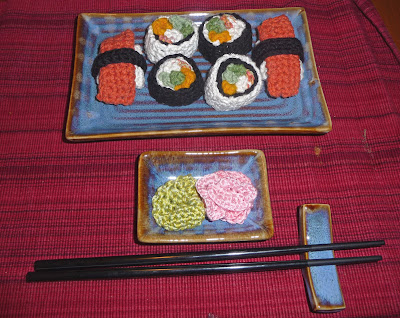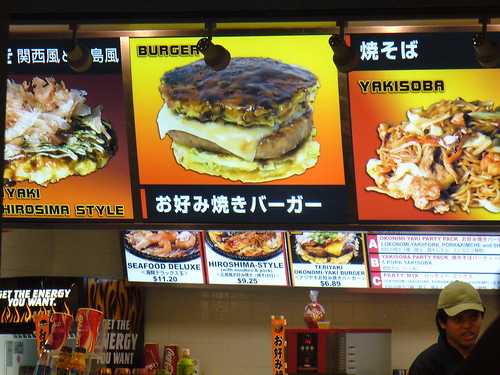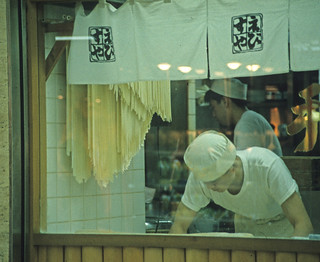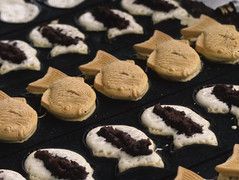Japanese Cuisine is Excellent, but Does It Deserve UNESCO Protection?
The Japan Times article on Japan’s application to UNESCO to have 和食 [washoku, Japanese cuisine] declared an internationally recognized “intangible cultural asset” is a fantastic display of modern cultural discourses. The combination of bad food history, the distortions of modernism, and abject credentialism is really quite disturbing.
 The attempt to leverage international affirmation into economic and cultural power is striking.
The attempt to leverage international affirmation into economic and cultural power is striking.
- “If washoku gets UNESCO heritage status, it will motivate Japanese chefs across the globe — and also enhance the quality of chefs in this country.”
- “Exports of Japanese agricultural and marine products were hit hard by radiation concerns, so international endorsement of washoku would be seen as a big plus.”
- “Chefs from high-ranked restaurants across the world are enthusiastic about learning how to cook Japanese food and also learning about the tableware and culture”
Japanese cuisine has been immensely influential in the world — attested to by the number of Chinese buffet places in my own little corner of the Midwest with sushi bars, not to mention three Japanese restaurants in neighboring Joplin, Missouri — and Japanese cuisine in Japan already has an immense amount of respect and power. But it’s not enough, apparently.
There’s also a powerful conservative impulse on display, pushing back against changing times
- “help Japanese people recognize the splendor of their culture as a whole and encourage more people to work in the traditional food industry.”
- “The Westernization of food in Japan is not necessarily a bad thing, but the move (toward an UNESCO listing) will be an opportunity to urge Japanese not to let their food culture fade.”
- “If washoku gets UNESCO heritage status, it will motivate Japanese chefs across the globe — and also enhance the quality of chefs in this country.”
- “an opportunity to urge Japanese not to let their food culture fade”
- “A government online survey shows … nearly 100 percent said they want to see the washoku tradition passed down to succeeding generations.”
 I don’t put a lot of stock in online government surveys, mind you, but there’s a very common dynamic at work there: everyone wants to preserve what’s special about the past, about the tradition, but there’s a shrinking number of people who want to actually live and work under traditional strictures or limit themselves to traditional artistry, and a shrinking number of people willing to pay enough for culinary or cultural artifacts to make strictly traditional methods economically viable.
I don’t put a lot of stock in online government surveys, mind you, but there’s a very common dynamic at work there: everyone wants to preserve what’s special about the past, about the tradition, but there’s a shrinking number of people who want to actually live and work under traditional strictures or limit themselves to traditional artistry, and a shrinking number of people willing to pay enough for culinary or cultural artifacts to make strictly traditional methods economically viable.
The predictable reiteration of cliches about distinct values and habits of Japanese food culture is probably what attracted the attention of celebrity chefs, though their claim that “Washoku is ‘respect for nature’ and serving to strengthen the bonds of family and community” actually goes beyond the original article. There we see a hash (so to speak) of claims about aesthetics — almost as many mentions of appearance as flavor — and healthfulness. I think my favorite, because of how much it reminds me of living in Japan, talking to Japanese about their own culture.
Makoto Osawa, director of policy planning of the agriculture ministry, said, “Japan, thanks to its shifting seasons, has a rich variety of food ingredients, while cooking methods vary depending on local conditions.” As an example of the diversity found in Japanese cuisine, the ministry cites “nabe” pot cooking from the Tohoku region, which developed out of the cold winters and active fishery industry.
 The implication that other societies don’t have shifting seasons, cold winters, active fishing traditions, or seasonal foods like the Japanese takes me back to our year in Yamaguchi, where nobody would believe that Americans from the mid-Atlantic and Midwest could have experienced anything like the heat or humidity of a Japanese summer. Washoku in this regard is an interesting mix of real regional traditions and an elite aesthetic heavily influenced by poetic aspiration. (1) Of course, Japanese consumers are full participants in a globalized industry of constant food production and availability — or they would be if their government didn’t continue to practice some fairly extreme forms of food security protectionism. Foods like eel which are now available year-round still have strong seasonal associations, and possibly even a seasonal consumption shift, but it’s unclear whether the Japanese are “locavores” in any meaningful sense.
The implication that other societies don’t have shifting seasons, cold winters, active fishing traditions, or seasonal foods like the Japanese takes me back to our year in Yamaguchi, where nobody would believe that Americans from the mid-Atlantic and Midwest could have experienced anything like the heat or humidity of a Japanese summer. Washoku in this regard is an interesting mix of real regional traditions and an elite aesthetic heavily influenced by poetic aspiration. (1) Of course, Japanese consumers are full participants in a globalized industry of constant food production and availability — or they would be if their government didn’t continue to practice some fairly extreme forms of food security protectionism. Foods like eel which are now available year-round still have strong seasonal associations, and possibly even a seasonal consumption shift, but it’s unclear whether the Japanese are “locavores” in any meaningful sense.
And the claims of healthfulness are interesting as well. Life expectancy and obesity rates compare favorably to the U.S., of course, but that’s not the highest standard in the world at the moment. Japan’s longevity has a great deal to do with their system of socialized medicine. Japan’s lack of obesity has a great deal to do with other factors as well, including low rates of automobile use and a mid-century rationing/famine that lasted over a decade. Food patterns matter, of course, and it’s certainly true that Japanese food patterns seem to persist longer than some other cultures (2) but it’s also true that Japan’s “traditional” food cultures are heavily shaped by deprivation and isolation rather than aesthetics or conscious healthful choices. (3) Humans have eaten seasonally and locally for thousands of years, though Japan’s early modern isolation extended the patterns.
 Don’t get me wrong, I think Japanese cuisine is great food, a worthy addition to global food culture, and the idea of a more seasonal, localized agriculture is economically and environmentally sound. But the modernist institutionalization of Japanese food culture as a traditional repository of modern virtues rests on a shaky intellectual foundation.
Don’t get me wrong, I think Japanese cuisine is great food, a worthy addition to global food culture, and the idea of a more seasonal, localized agriculture is economically and environmentally sound. But the modernist institutionalization of Japanese food culture as a traditional repository of modern virtues rests on a shaky intellectual foundation.
- (1) I just got a book announcement for Haruo Shirane’s Japan and the Culture of the Four Seasons that argues for “the central role of waka in constructing a vision of nature that influenced all the arts.” blurb credited to Andrew M. Watsky, Princeton University [↩]
- (2) e.g. Susan B. Hanley. Everyday Things in Premodern Japan: The Hidden Legacy of Material Culture (1997) [↩]
- (3) ibid, plus WW Farris, Japan To 1600: A Social and Economic History [↩]
